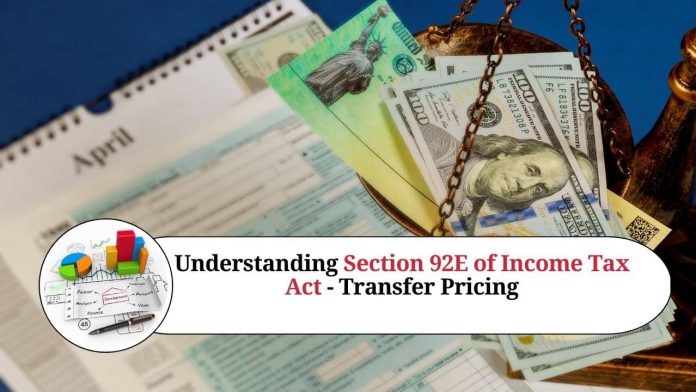92E of the Income Tax Act, of 1961 deals with Transfer Pricing. This section was introduced to curb the practice of multinational companies shifting profits to low-tax jurisdictions by manipulating the prices of goods and services between related parties. The provision mandates that all international transactions between related parties must be conducted at arm’s length, which means that the transaction should be carried out as if the parties were unrelated and independent of each other.
Scope of Section 92E Section
92E applies to all international transactions between related parties, which includes transactions of tangible and intangible goods, services, loans, and guarantees. The related parties could be companies under the same ownership, companies having a controlling interest in one another, or those under common control.
Arm’s Length Price
The arm’s length price is the price that would have been charged by independent parties dealing at arm’s length in comparable transactions. To determine the arm’s length price, various methods such as the Comparable Uncontrolled Price Method (CUP), Resale Price Method (RPM), Cost Plus Method (CPM), Transactional Net Margin Method (TNMM), and Profit Split Method (PSM) can be used. The most appropriate method is selected based on the nature of the transaction and the availability of data.
Maintenance of Documentation
The Income Tax Act mandates that taxpayers must maintain documentation for all international transactions with related parties, including details of the transactions, methodology used for determining the arm’s length price, and any adjustments made. The documentation must be prepared and maintained annually and should be available for inspection by tax authorities.
Penalties for Non-Compliance
Non-compliance with the provisions of Section 92E can result in significant penalties. The penalty for failure to maintain documentation is 2% of the value of the international transaction or Rs. 10 lakhs, whichever is higher. In case of incorrect documentation, the penalty can be up to 2% of the value of the international transaction or Rs. 10 lakhs, whichever is higher. Additionally, there can be penalties for failure to furnish documentation during tax assessments or for providing incorrect information to tax authorities.
Conclusion
In conclusion, Section 92E of the Income Tax Act is an essential provision to prevent tax avoidance by multinational companies. It ensures that related parties conduct transactions at arm’s length, which helps in ensuring fair taxation. Taxpayers must maintain adequate documentation and comply with the provisions of the section to avoid penalties. The government has been taking steps to strengthen transfer pricing regulations in recent years, and taxpayers must stay updated with the changes to avoid any compliance issues.
Other Related Blogs: Section 144B Income Tax Act
Frequently Asked Questions
Q:1 What is Section 92E of the Income Tax Act?
A: Section 92E of the Income Tax Act, 1961 deals with the computation of income arising from an international transaction or specified domestic transaction between associated enterprises.
Q:2 What is an international transaction?
A: An international transaction refers to a transaction between two or more associated enterprises located in different countries. It may include the sale or purchase of tangible or intangible property, provision of services, or lending or borrowing of money.
Q:3 What is a specified domestic transaction?
A: A specified domestic transaction refers to a transaction between two or more associated enterprises located in India, where the value of the such transaction exceeds Rs. 20 crores.
Q:4 Who are associated enterprises?
A: Associated enterprises are entities that are related in terms of ownership, control, or management. They may be subsidiaries, holding companies, or companies under common control.
Q:5 What is transfer pricing?
A: Transfer pricing refers to the pricing of goods, services, or intangibles between associated enterprises. It is used to ensure that the transaction is conducted at an arm’s length price, which is the price that would be charged between unrelated parties in similar circumstances.
Q:6 What is the penalty for non-compliance with Section 92E?
A: Non-compliance with Section 92E may attract a penalty of 2% of the value of the international or specified domestic transaction.
Q:7 What is the due date for filing Form 3CEB?
A: The due date for filing Form 3CEB is 30th November of the relevant assessment year.
Q:8 What is the role of a chartered accountant in complying with Section 92E?
A: A chartered accountant can play a significant role in complying with Section 92E by guiding transfer pricing regulations, preparing transfer pricing documentation, and certifying Form 3CEB.




















